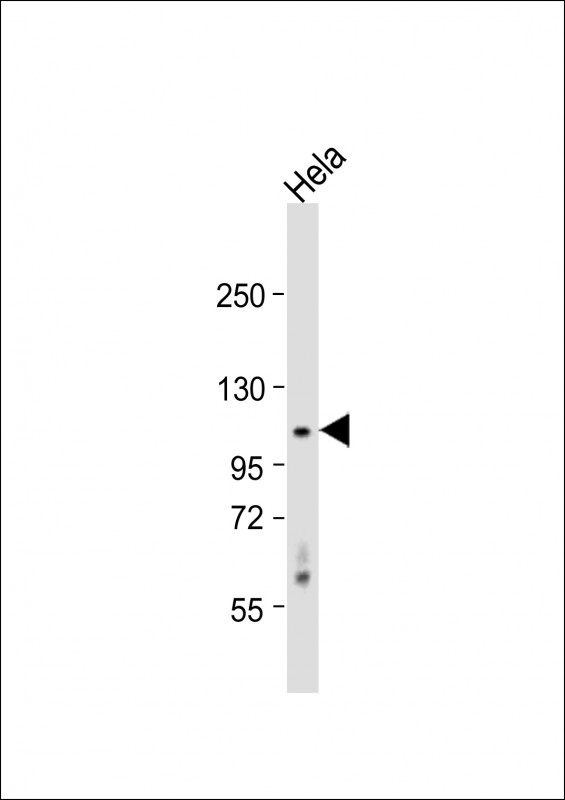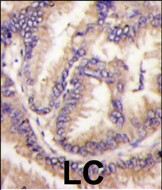


| WB | 1/1000 | Human,Mouse,Rat |
| IF | 咨询技术 | Human,Mouse,Rat |
| IHC | 1/100-1/500 | Human,Mouse,Rat |
| ICC | 技术咨询 | Human,Mouse,Rat |
| FCM | 咨询技术 | Human,Mouse,Rat |
| Elisa | 咨询技术 | Human,Mouse,Rat |
| Aliases | Cyclin-dependent kinase-like 5, Serine/threonine-protein kinase 9, CDKL5, STK9 |
| Entrez GeneID | 6792 |
| WB Predicted band size | 107.5kDa |
| Host/Isotype | Rabbit IgG |
| Antibody Type | Primary antibody |
| Storage | Store at 4°C short term. Aliquot and store at -20°C long term. Avoid freeze/thaw cycles. |
| Species Reactivity | Human, Mouse |
| Immunogen | This CDKL5 (STK9) antibody is generated from rabbits immunized with a KLH conjugated synthetic peptide between 982-1012 amino acids from the C-terminal region of human CDKL5 (STK9). |
| Formulation | Purified antibody in PBS with 0.05% sodium azide,1%BSA and 50% glycerol.prepared by Saturated Ammonium Sulfate (SAS) . |
+ +
以下是关于CDKL5(STK9)抗体的3篇参考文献示例:
---
1. **文献名称**: *CDKL5 mutations in boys with severe encephalopathy and early-onset seizures*
**作者**: Bahi-Buisson, N., et al.
**摘要**: 该研究通过免疫印迹和免疫组化技术,使用特异性CDKL5抗体分析了患者脑组织中的蛋白表达,发现CDKL5突变导致蛋白截断或功能丧失,与严重神经发育障碍相关。
---
2. **文献名称**: *Characterization of a polyclonal antibody to the CDKL5 protein*
**作者**: Chen, Q., et al.
**摘要**: 研究报道了一种针对CDKL5 C末端区域的多克隆抗体的开发与验证,证实其在Western blot和免疫荧光中特异性识别CDKL5蛋白,并应用于神经元细胞定位研究。
---
3. **文献名称**: *CDKL5 protein substitution therapy rescues neurological phenotypes in a mouse model of CDKL5 deficiency disorder*
**作者**: Riccitelli, V., et al.
**摘要**: 利用CDKL5特异性抗体评估小鼠模型中蛋白表达水平,验证了抗体在脑组织切片和蛋白质功能分析中的可靠性,为治疗策略的疗效评估提供关键工具。
---
以上文献涵盖了抗体开发、验证及在疾病模型中的应用,可作为CDKL5抗体研究的参考。
The CDKL5 (Cyclin-dependent kinase-like 5) gene, formerly known as STK9. encodes a serine/threonine kinase predominantly expressed in the central nervous system, particularly in neurons. This protein plays a critical role in neurodevelopment, synaptic plasticity, and neuronal connectivity, though its precise molecular mechanisms remain under investigation. Mutations in CDKL5 are linked to CDKL5 deficiency disorder (CDD), a severe neurodevelopmental condition characterized by early-onset seizures, intellectual disability, and motor impairments, often overlapping with Rett syndrome-like phenotypes.
CDKL5 antibodies are essential tools for studying the protein’s expression, localization, and function in both normal and disease contexts. These antibodies enable researchers to detect CDKL5 via techniques such as Western blotting, immunohistochemistry, and immunofluorescence, aiding in the exploration of its role in brain development and pathophysiology. Specificity validation (e.g., using knockout controls) is crucial due to potential cross-reactivity with related kinases. Recent studies also employ CDKL5 antibodies to investigate post-translational modifications, interaction partners, and downstream signaling pathways disrupted in CDD. Additionally, they support therapeutic development, including gene therapy or protein replacement strategies. Understanding CDKL5’s biology through antibody-based research continues to shed light on neurodevelopmental disorders and potential interventions.
×